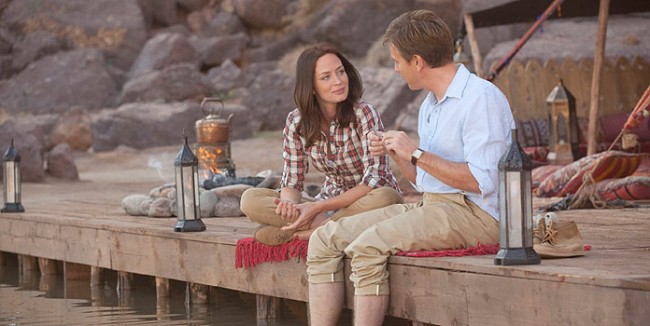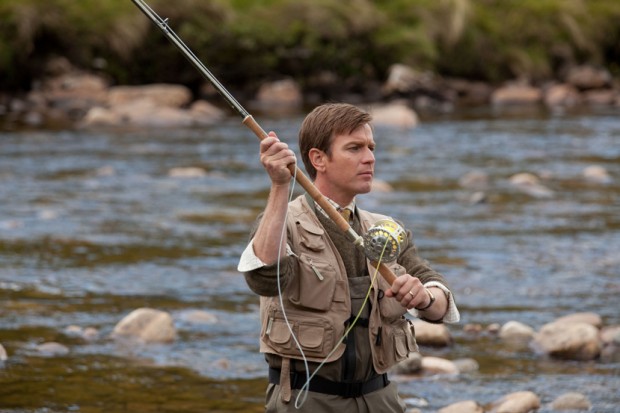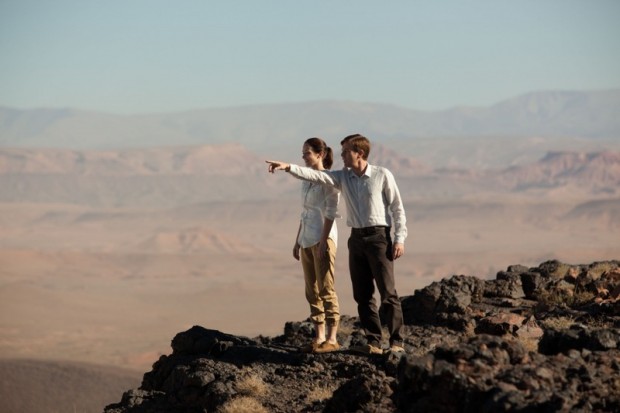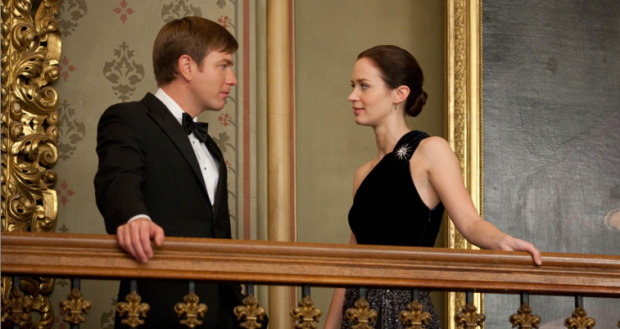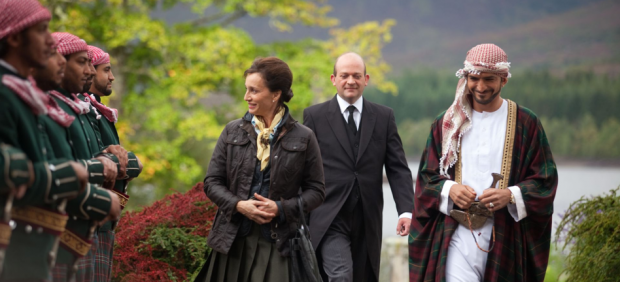
It started, like all good interviews do, with a threat. Ewan McGregor and Emily Blunt, stars of the recently released Salmon Fishing in the Yemen (read my review) waltzed into the room and sat down amongst my mostly-international press brethren when McGregor jokingly threw his iPhone into the middle of all of our sound recorders, warning that he would tape the proceedings to make sure he wasn’t misquoted. “And I want a picture with all of you at the end.” After we learned what Miss Blunt was wearing (some brand names, and a top she just happened to buy, as she seems to be a regular person some times), we began the questioning blitz.
In the following transcript, my fellow journalists and I learn about Emily working with her neighbor, what the two consider sacrifices, and who Ewan guarantees to cast in his directorial debut, even though he doesn’t yet have a script. What you can’t get from this is text how charming they were, leaving the room with our pants on the floor, showing the great chemistry that’s so evident on the screen.
Ewan, you do multiple projects every year. How do you decide what you’re going to do, as they’re so varied.
Ewan McGregor: Well I [have a] very simple… I just read scripts, and if they grab me…. There isn’t any kind of system. I try not to concern myself with how big the film is or who’s directing it or who’s written it to begin with because I feel like the script is the foundation of everything. There’s some great many talented people who work on a movie, and that’s one of the things that makes this [job] really exciting to work in.
However, if the foundation isn’t great, all of that talent can’t make a great film, I don’t think. But if you’ve got a good script, then all of that extra talent that’s working on the script can make it something really amazing. So I just go on my instincts. I’m drawn to things that I haven’t read before. I’m drawn to things that don’t feel like versions of other movies. If I feel like I can see the movie’s beats as I go along, I’m not interested. If I can see myself in the part as I’m reading it, then that’s a good sign, too.
Do you remember what it was about this script in particular that you zoned in on?
EM: It was an amazing story. It’s an unusual, lovely story. I loved Fred in it, the way he is in the beginning compared to the end. There’s really something to play there, there’s a lot to get your teeth into. It made me laugh. And I found myself wanting the project to work. As we’re getting near the end of the script, I was hoping that it was going to work. And to Lasse [Holmström]’s credit, he absolutely put that on film. I think it’s quite a clever thing that by the end of the film, you want us [looks at Blunt] to be together but you also still want the project to work, and you’re still enjoying the the political satire. He’s managed to keep all the strands in the air right to the end.
Do you have a nerdy side to you like Fred?
EG: Well I suppose so. Every part you play, you come up what you do through your own imagination, your own experience. And yeah, sure, there are bits of me in there. I don’t know what they are, I don’t analyze it. [to Blunt] Am I a nerdy person?
Emily Blunt: No. You’re goofy. Silly.
Both of your characters go through personal adventure trips in this movie. What is the most adventurous thing you both did in the recent past?
EB: The first really adventurous experience I had was when I was about fifteen. I [attended] a really fantastic school with a particularly fantastic Biology teacher who traveled, Miss Malevich, and she organized these expeditions for the kids to go away to these extraordinary places like India. My year went to Tanzania. And to raise all of the money yourself. So at fifteen, when all you’ve really been concerned [with] is whether you’re going to go to Jo Ward’s party that night–
EM: Did you get to go?
EB: I did. She’s my best friend, so I was allowed. Didn’t get invited to Dominic Kirk’s, but who did?
EM: Yeah, no one wants to go there anyway.
EB: And so we went to Tanzania and we camped by a local school and we built classrooms and toilets for the school and then we hiked Mount Meru. It was absolutely mind blowing. I remember being at that age and just being blown away by it, and that’s probably the first memory I have of doing something incredibly different.
EM: I did two really big bike trips. I rode from London to New York in 2004 and from Scotland to Cape Town in 2007. Those were incredible adventures.
But to be honest, the hard thing about both those trips was being away from my wife and my kids for a long time. And I’m away from my family periodically with my work, and I can’t justify it, personally, myself, going away on my own free time.
The movie focuses on the relationship between the two of you, and it focuses on the inner workings of dealing with a bureaucracy, but I wanted to know if there is anything you learned during the film about the Yemen, about the region, about the kind of life style over there?
EM: Not particularly.
EB: No, not particularly. I knew a little bit about the Yemen. I think it’s the poorest country in the Arab world, and I’m sure it’s the most [troubled]. And there was obviously no way we would shoot there, as it was on the brink of a civil war at that point. But no, I don’t know if I learned a huge amount about the Yemen, other than what the script involved.
Emily, you’re working with Jason Segel for a couple of films. Can you discuss working with him?
EB: He’s great. He’s such a silly buffoon, he’s fabulous, and he’s my friend. We had a really good time. All those guys in that Judd Apatow world, Nick Stoller and all those guys, they believe in a huge amount of improv. You stretch these scenes around and do them so many different ways and I think you can catch these very golden, spontaneous, hilarious moments that you couldn’t quite get in a scripted scene. And they were very collaborative with me.
They believe in funny women, which is a relief, because you read so many comedic scripts where the girlfriend is the pill who’s wagging her finger at her hi-laaaarious husband! It’s so weird, y’know? I just don’t want to play that part. So when I went in and they pitched me the movie I said, “please don’t make me that part, I just don’t want to do it.” So they gave my character as many [comedic] set pieces as the guy and I was really thrilled about that. It was fab. I enjoyed it, a lot.
And he’s your neighbor?
EB: He’s my neighbor! He lives about two minutes away from me, yeah.
So both of you have been in independent movies and big blockbusters, or bigger projects. Which do you prefer, and what’s the big difference for you?
EM: There’s no really big difference other than the number of people involved. The smaller films feel more intimate. You know everyone on the crew.
EB: They’re satisfying, those smaller films. I think the bigger budget…. It depends on what kind of movie. The bigger budget could be a special effects movie which could be quite tedious. You’re working with a green screen…. It’s just not as satisfying. But then you can get these bigger budget movies that…. I mean, god, something like Oceans 11 would’ve been fantastic and I know all of them had a blast on it even though it was a huge budget. That was real stuff, that was real work, so I think it depends on the type of movie, probably.
EM: It’s much more relevant to us who the director is and how they like to work.
Is it more stressful when there’s a lot of money involved?
EM: No, not necessarily. It doesn’t make any real difference to the way you act. You don’t have a big budget acting style and a low budget, independent acting style. You’re doing the same job on both. So it’s much more a question of the atmosphere on the set.
EB: This is my money acting. This is my poverty acting.
Do you have any preference in a style of director?
EB: The thing I look for in a director is a point of view and an openness. I will take a spirited opinion over a vague one any day of the week, because I believe in that. But they have to have an openness, to allow you to play and to identify with [the work] yourself. The directors that I’ve worked with who have a very clear preconceived idea of what they imagine the scene to be, you kind of have to fight against that a bit, because you never know how a scene will leap off the page, or how you should sit, or how any of it should be.
So I think it’s lovely when you work with a director who has a clear idea of what they want, but they’re open to the fact that you might have a better one. And vice versa. That’s what I tend to look for.
EM: It’s all about character. A [preferred kind of] director is something undefinable, because I’ve worked with directors who are very strict, tell you exactly where to be, and even how to say lines [then] at the end of the experience realize that they’re incredible directors. And I’ve worked with ones who–I just think there’s no rhyme nor reason to it. It’s just very much how they are as people. For some reason, it’s a combination of your character and their character and that’s what ends up being what you do on film, I think.
Ewan, you’re very prolific and you’ve done many different types of roles. At this point in your career, what I’m curious about is there anything on screen that you haven’t done that you’d really like to try?
EM: I haven’t directed a film. I’ve directed a short film but I’d love to direct a film. I don’t want to do it for the sake of being able to say I’ve been a director or that I’ve been in charge. I want to do it because I have a story that I’m really bursting to tell. I look forward to it because I made my little short film [over] four days and I loved it so much. Realizing a scene that you had in your head in front of the camera is really exciting.
I just haven’t found [the script] yet. I had an opportunity with a film that I just bottled it and I got scared [to make it]. Just recently I found a story that I really loved [but] this time I went after it and I found that someone else is making it, even though it’s a story that happened in 1968 or something.
What were these stories that other people made?
EM: It doesn’t really matter what they were (laughs from all). One day something will crop up because I really want to do it. I think it’s the natural extension of all the experience I’ve had on film sets.
EB: And you’ll cast me in it.
EM: You’ll be in it. You will be in it.
EB: It’s official! You heard it here.
Your character, Ewan, is kind of an ass, but you, Emily, have to fall for him.
EB: He’s an amusing ass.
Well he presents himself as such, since he really doesn’t believe in this fishing idea so he’s not giving you the easiest time.
EB: Well he’s in a different place by the middle of the movie, towards the end of the movie. In the beginning I think he’s just incredibly upset about this preposterous idea and I represent that. As the film goes on, and discovering Harriet’s boyfriend is presumed dead, she’s the one to lose hope and lose faith and he sort of takes that [mantle] over. He’s very kind and tender and sweet with her. Both of them are shifted by this experience. I think that’s what’s nice about it. People change and your opinion of them can change.
What was it about him that–
EB: What wasn’t it? It’s about those waders! How he looks in a pair of waders. I don’t know. It’s a combination of so many things. I think it’s quite hard to sum up why you fall in love with someone. It just happens, you know?
One of the themes of this film is infidelity, and that’s kind of a scary thing for a film that’s so light on its feet. I wanted to know how you address that and if you were concerned about either of your characters coming off as irrational or rash?
EM: No, I think it was kind of true to life. I liked it because it took it away from being a romantic comedy, as far as I was concerned. It’s muddy and it’s complicated.
EB: They’re very respectful of each others’ situations, I think.
EM: They become friends first and fall in love with each other [after]. I think it’s not easy and it’s complicated and it made me think that it’s quite a grown up storyline, not the kind of run-of-the-mill “romcom” situation. And it’s part of [Fred’s] coming to know himself is to realize that this relationship he’s in is not a healthy one.
It’s also a film about sacrificing. Do you feel that you have sacrificed anything in your life for your careers?
EB: The only thing that I feel that you sacrifice is the time away from the ones you love, really. That’s the only sacrifice that I feel like I’ve made. But it’s not a big enough one to be concerned with.
EM: I don’t see it that way. This is my job, how I support my family, and that entails being away from them sometimes. I don’t like it, but that’s the way it is. It’s a sacrifice when you come home from set at the end of the day and you’re on your own and you wished you were back at home. But at the same time, I’d hate to see in print that I said that that’s a sacrifice for my profession, because my profession feeds my family and puts them through school. This is what I do with my life, all I’ve ever wanted to do.
Do you think that fame is a sacrifice?
EM: No, because I don’t spend any time worrying about it. I don’t think so. I think if you concern yourself with fame or the idea of being famous then you’re sacrificing your brains. But I think if you accept it as being part of the job–
EB: –A side effect–
EM: –Then you deal with it as best you can. But it’s difficult to deal with when you’re younger. I think it takes you a while to work out how to deal with it and see it for what it is.
Did you read the book, or just the script?
EM: Yes, both. After reading the script. In everything I’ve ever done that’s been adapted from a book I’ve done it that way ’round, getting sent the book after I’ve read the script. Then it fills in the gaps, in a way. It’s kind of a resource for your character. However, I think if you read the book first, and you love the book, then you read the script, you might be upset that things are missing.
Salmon Fishing in the Yemen is in now in limited release.


